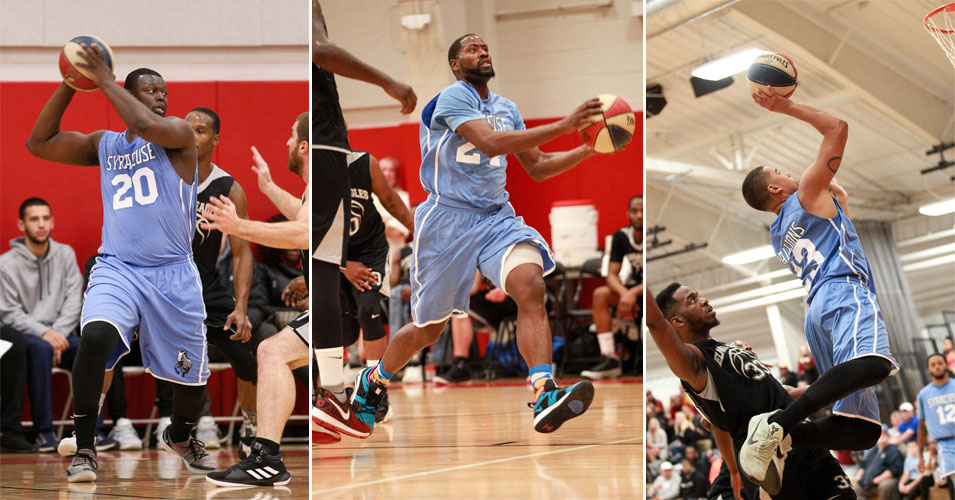When the Syracuse Stallions kicked off their inaugural season Oct. 28 against Oneonta, it marked a new era for sports-hungry Central New Yorkers. But for the players on the city’s new American Basketball Association professional team, it represented a return to competitive sports while living regular lives. Many of the key players competed on local youth and college teams, back when they didn’t have commitments to employers or families.
For four men on the Stallions, those commitments include parenthood. Forwards Mickey Davis and Lloyd Parkmond, and guards Chris Gilkes and Kenton Chan-Man have six children among them.
Family Times caught up with the Stallions dads this fall to learn how they balance their time at their home court (at Manlius Pebble Hill School in DeWitt), away games, work and staying connected with their kids. (Interviews have been edited and condensed.)
Kenton Chan-Man
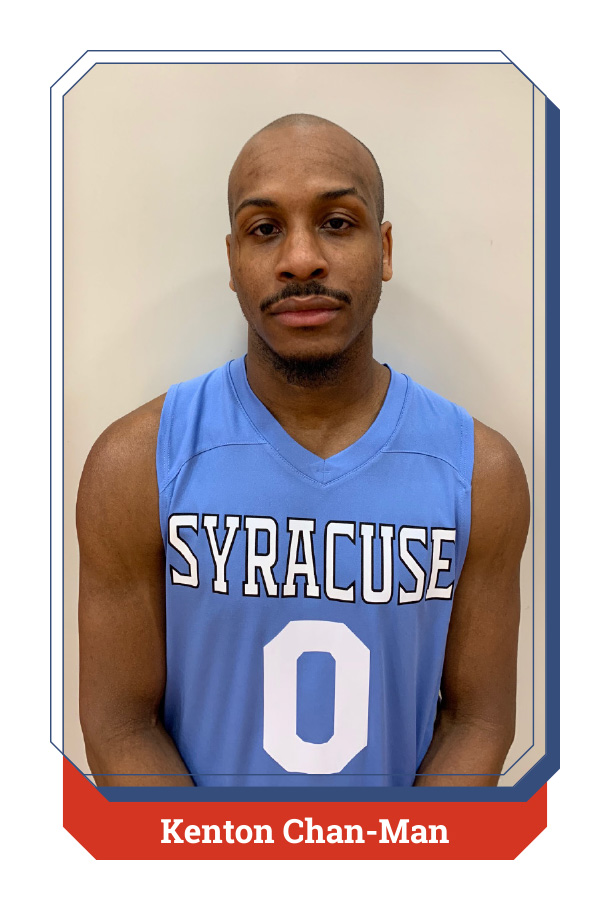
Tell me a little bit about how you started playing.
Chan-Man: I originally started playing at 9. I just kept seeing my older brother, Perry, going out and playing. He was the person I really wanted to be like when I was growing up.
When did you realize that basketball could have a positive influence on your life?
Chan-Man: I was in the ninth grade. I wanted to make a name for myself, not feed off my older brother. I have a different style of game than he does. And to this day, I’m the brother with the better shot (laughs).
By my senior year, I wanted to find a way to put myself through school. I didn’t want to bother my mom. I didn’t want to have to worry about loans. I had to get someone to see me and give me a scholarship to go to school.
How did you connect with the Stallions?
Chan-Man: Mike Sugo (Sugamosto, Stallions president) had a tournament and I played in it last year. I like him as a person and I guess he likes how I play basketball. He asked me to come to the tryouts. I thought about it and I was like, “It’s the first year. Let’s do something and put this team on the map. Who knows?” When I tried out, I figured I’d might as well take this opportunity and run with it. It works with my work schedule, so it’s a great opportunity.
Everyone on the team comes from different backgrounds and situations. How has it been coming together?
Chan-Man: It’s been a pleasure. We help each other out. We all have one thing in common, and that’s basketball. We all want to win.
What does your family—especially your daughter—think about you being able to continue playing?
Chan-Man: She likes seeing me play. When Mike was first talking to me about the Stallions, my girlfriend was behind me. She said go for it. She played basketball as well. I’m having fun doing something that I love.
How easy has it been to fit it into your schedule?
Chan-Man: It works with my work schedule, but adding something always creates challenges. You know what you signed up for, and if you have your family behind you, that’s going to keep pushing you.
There seems to be a real effort to get the Stallions involved in the community. How do you see that developing as time goes on?
Chan-Man: I see it developing very well. Basically, I’m an outsider because I’m not from here. Meeting new faces and new people has been great for me, putting a smile on the kids’ faces just with a signature. And we have (former Syracuse University standout) Dajuan Coleman on our team as well. Everybody loves him. So, being around him and watching how the kids run up to him, it’s been great.
Whenever I can go to any of the events, I go. It’s fun. And it helps because when they come out to the games, they’ll know who they are rooting for.
You mentioned that your girlfriend also played basketball. Is your daughter interested?
Chan-Man: She plays here and there, but she likes dancing and gymnastics better (laughs). I let her be who she is. I wasn’t forced to play basketball, so I’m not going to force it on her. If she wants to play, then Daddy and Mommy will be there to teach her a thing or two. Once you have support, you can do anything.
Mickey Davis
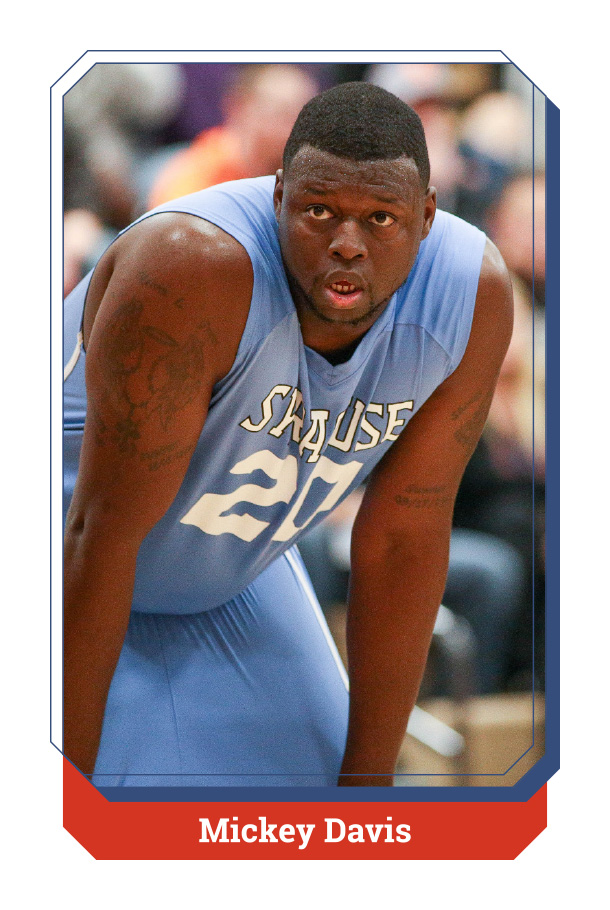
Like Chan-Man, forward Mickey Davis was drawn to basketball at a young age. The Syracuse native played in the city’s Youth Enrichment Outreach Program (YEOP) basketball league. By the time he got to Henninger High School, Davis was dreaming of the NBA and planning on attending college. He transferred to Jamesville-DeWitt High School, then played for Morrisville State College for two years, averaging 17.5 points during the 2012 season. Davis led the Mustangs to a conference championship and their first-ever NCAA tournament bid. His college success led to a stint playing professionally in the Dominican Republic.
Family ties brought Davis back to the Syracuse area, and with the Stallions, he says he now has the best of both worlds.
What’s your earliest memory of playing basketball?
Davis: I’ve been playing since I was 4. It was in YEOP, a youth league in Syracuse. The coach was Renny Dowdell, and he was like a father figure to me. Also, I would watch basketball with my dad and I would start mimicking (those players). My dad would tell me that I had the talent.
What was your coach’s advice early on?
Davis: He was telling me mainly to keep my head on straight. Like, “You can be one of the best if you keep pushing forward.” I just kept trying to believe that I could do something great.
How did you transition a love for the game to a goal?
Davis: At Henninger, the coaching staff basically told me that I could get to the NBA if I kept working at it. Once they told me that, I got it in my mind that I needed to take basketball a little more seriously.
When I transferred to JD, Coach (Bob)
McKinney helped me perfect my shooting, gave me different tools as a versatile player.
Was it difficult to leave your Henninger teammates behind?
Davis: It was. But at the same time it was an opportunity to get a good education. It was a make-or-break for me. It was my call, and I chose JD.
You became a dad during your time playing in college.
Davis: Yes. I saw my older son on holidays and sometimes on weekends. My mom and my dad would bring him up for games. It was always good having him there, watching me play. But it was also hard because I didn’t see my son enough then. I have two sons now. Dominick is 8, and Giovanni is 3.
So your boys will be able to see you play with the Stallions.
Davis: They will be able to come see me play all the time. It will be great seeing them in the crowd, cheering me on—wearing their little Stallions shirts (laughs). Giovanni is getting older and he is starting to come along in basketball. My 3-year-old is starting to learn how to dribble. It’s great that I’m going to be able to give my knowledge back to my sons, the way the game is supposed to be played.
For how long did you play in the Dominican Republic?
Davis: I was there for about a year. The structure of the league was very different from American basketball, but it was a great experience, and if I had a chance to get back over there, I would. But, being 29, you have to start looking for a full-time career.
Is it difficult, juggling the Stallions with work and family?
Davis: It’s been a little stressed, but that’s life. It’s all about timing and scheduling. It was shocking at first. Then I thought, “You know what? This is going to be fun.” These are guys I’ve grown up playing with from all over the county, and I’m playing with guys who know how to play the game. We’re playing professional, organized basketball, which I love. I’m kind of excited about that.
Lloyd Parkmond
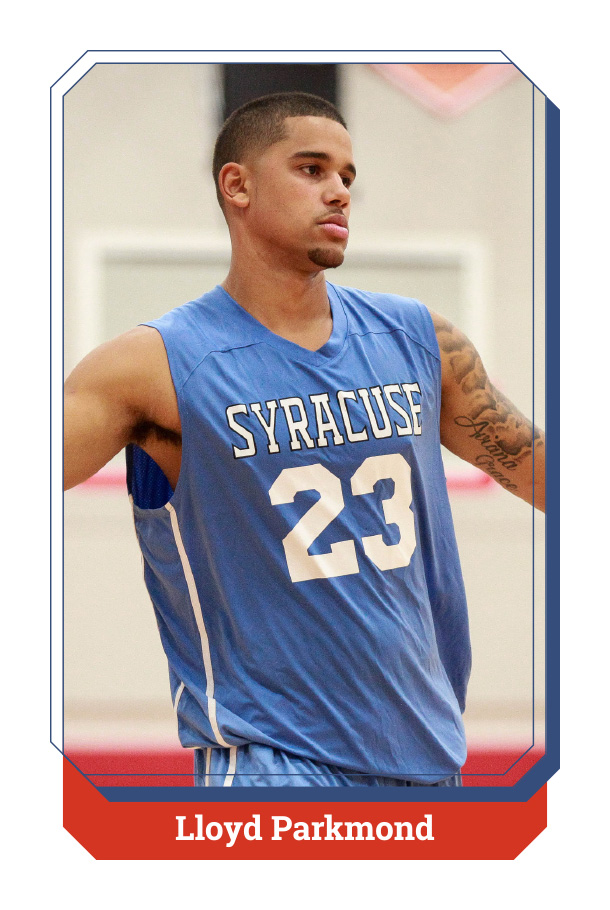
Like his Stallion teammates, Rome native Lloyd Parkmond racked up some hefty stats during his college days. A high-scoring playmaker at Onondaga Community College and SUNY Delhi, Parkmond was ready to put the idea of professional basketball in the rearview mirror when he connected with the Syracuse Stallions. Once back on a team, Parkmond says he realized that the game he loved still had an important place in his life.
Parkmond’s 7-year-old daughter, Aviana, lives in Florida, but he says she understands the importance of this new opportunity.
How old were you when you first started playing?
Parkmond: I first started playing in fifth grade, for the Gansevoort Gators. Bruce Harris was my first coach. I’ve known him my whole life. We won the championship that year. I was young, so it definitely motivated me to keep getting better.
There is a good mix of local notables on this team. How has that come together?
Parkmond: It’s been great so far. A lot of us from the Syracuse area know each other from high school basketball or various leagues around here, different tournaments. To build camaraderie, it helps that we all respect each other’s game. We all know that each other can play. We all know that each of us has essentially been “The Man” at some point in our careers.
Respect definitely goes a long way in forming camaraderie, especially since we’ve got a lot riding on this, our first season. I feel there are very high expectations because there is talent on this team that is unreal.
Your daughter lives in Florida. How do you maintain a good bond?
Parkmond: It hasn’t always been that way. She lived up here at one point when I was in college. She comes up every summer and every Christmas. We schedule around her breaks from school.
Does she understand your love of basketball?
Parkmond: Oh, she has been to so many games, and she always rolls her eyes when I try to change the channel to basketball on TV, and interrupt her cartoons or whatever. But she was up here when I found out that I had made the team. It was great for her to be here at that moment. She likes that I play basketball, but soccer is her thing.
Is the rest of your family looking forward to this season?
Parkmond: They’re all super-excited. My mom (Betty Parkmond) was crying for days when I told her I made the team. I want to say a couple words about her because she has been instrumental to me being on this team. I wouldn’t have been able to play college basketball without her. None of this would have been possible without her. My grandfather, he is super-excited because he has always attended all of his grandchildren’s games. Nobody played after last season, but now he gets to go again.
Do you think Syracuse will get behind you guys and support this new team?
Parkmond: I think there is going to be an incredible amount of local support. Everyone I’ve spoken to about this team is excited—even from outside of Syracuse. I know most of Rome will be there watching (laughs). Syracuse is a sports city. Everyone knows that. They support everything from the Syracuse Orange to the high schools. I hope the problem is that we don’t have enough seating. It’s not going to take long for the word to spread about this team.
The Stallions, as an organization, seem committed to reaching out into the community. Do you see yourself getting involved with that?
Parkmond: I’ve been to a couple of events; we’ve interacted with a ton of kids. I’ve always had this knack of using my position to create happiness for kids. So, when we show up to a party or some event, it really does bring joy to them, which in turn brings joy to us.
Chris Gilkes
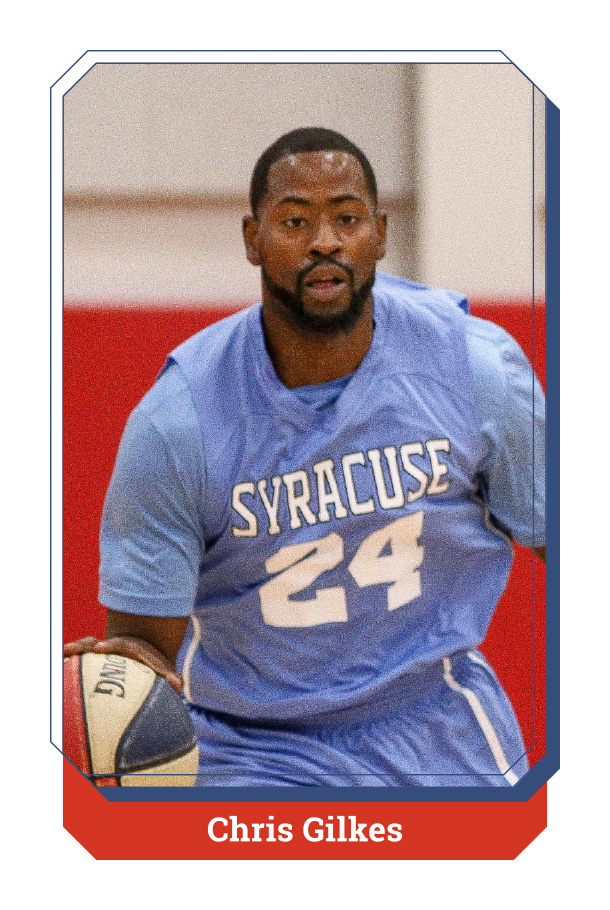
Over four seasons at the State University of New York at Oswego, Chris Gilkes earned a reputation as a versatile player with impeccable commitment. He’s brought those qualities to his role with the Syracuse Stallions. Content in his role as a working dad of two sons—Chris Orlando III, 9, and Aiden, 7—Gilkes says he wasn’t really looking for serious competition when the Stallions came to town. But he has enjoyed the opportunity to keep playing basketball at a high level. And, when it comes to participating in promotional events with young fans, Gilkes is a natural.
What was it about basketball that grabbed you early on?
Gilkes: It’s peaceful for me, honestly. When I was younger, and going through some things, I’d just go to the basketball court and it was my home. No one can bug you on the court. Kobe (Bryant) was my favorite player and I’d just imagine playing full court games with Kobe. I’d keep score in my head and just play until I felt calm and happy. I just fell in love with the game through that. I’d build friendships as well.
When did playing beyond high school become a goal for you?
Gilkes: It was probably after my junior year in high school. I realized I was good enough to play at least some type of college ball. Playing AAU (Amateur Athletic Union) made me realize I was OK. I saw that I could hold my own, and that if I stuck with it, I could play college ball.
Also, I found out that I was having a son in June before my senior year. That made me take it a bit more seriously—finding a college to accept me. I wanted to get a degree; I wanted to be able to provide for him.
How does it feel to still be able to play at a high level with the Syracuse Stallions?
Gilkes: It’s great. Honestly, I missed having a team; I missed being able to compete for something—something for real. Now, we’re representing Syracuse. Hopefully, we can bring more light to Syracuse, some love and more attention.
Is there anything that surprised you about this experience?
Gilkes: The surprise is going to be us as a team. I don’t think people thought we were going to do so well. But I think we are going to surprise a lot of people with our talent, our chemistry, and our mindsets. We all bring a certain unique skill to the table and I can’t wait for people to see how we put it together.
Is it daunting to think about the expectations?
Gilkes: Not really. I want to be able to represent Syracuse in a good way. I want people to be proud to come out to our games. We’re just focused on playing basketball, giving the fans a good show.
Is there anything from basketball that you apply to other aspects of your life?
Gilkes: Basketball is one of the most positive aspects of my life: the hard work, dedication, patience, and the determination. It’s been like my freedom from everything. It’s like music to my ears, my peace. That’s my home right there on the court, no matter what’s going on in my life. It’s a problem blocker. It’s taught me a lot and made me grow up a lot, introduced me to new people.
Your older son plays now. Is it hard to just sit back and watch?
Gilkes: You want them to do so well, but it’s just fun watching them. As long as he likes playing and is loving the game, I love watching him. It’s tough not to tell him stuff, but I don’t want to be a coach from the sideline. I wait until after the games (laughs). It’s a blessing to see my son play something I like. If he ever takes it seriously, that will touch my heart even more.



